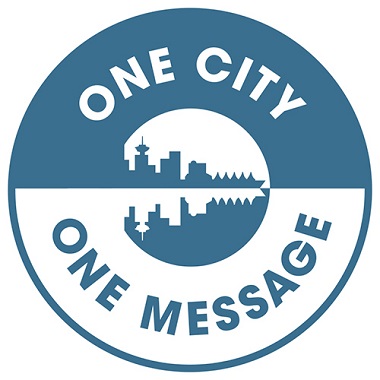 The same sermon theme will be preached in churches all over Vancouver on Sunday June 11. Our theme: welcoming the stranger. I feel giddy with anticipation as I type! This is a response to the present fear-based political climate, especially in the United States, that breeds suspicion of ‘outsiders.’ It is also a response to the isolation that many Vancouverites feel, daily.
The same sermon theme will be preached in churches all over Vancouver on Sunday June 11. Our theme: welcoming the stranger. I feel giddy with anticipation as I type! This is a response to the present fear-based political climate, especially in the United States, that breeds suspicion of ‘outsiders.’ It is also a response to the isolation that many Vancouverites feel, daily.
Together, we are sending a unified message to the city, a vision of the kingdom: the radical welcome of God, in Christ.
The idea for One City, One Message came initially from city councillor Andrea Reimer last November at the City Summit, a city-wide consultation of pastors and ministry leaders interested in pursuing together the well-being of their neighbourhoods and the city.
The theme of welcoming the stranger is timely: survey-based research by the Vancouver Foundation shows that Vancouverites are experiencing a crisis of social isolation, a corrosion of care that results in a silo mentality.
This is timely, too, as we are living in a period of unprecedented global displacement, where more than 65 million people around the world have been forced from home. In this context, many Canadian Christians are frustrated by populist politics that scapegoat vulnerable people such as refugees. The murder of six people in the Centre Culturel Islamique de Quebec mosque is a tragic symbol of the human toll of fear-based politics.
Many thoughtful Christians are also concerned that their church is not more diverse. Others wonder why their church doesn’t embrace vulnerable people in their neighbourhood.
Intuitively, we know that Christ’s way is different. But, where to start?
Scripture teaches us that radical welcome doesn’t come out of thin air; it begins with gratitude for God’s gifts. A First Nations leader once said, “Human beings are like my pigs. They eat the apples, but they never look up to see where the apples have fallen from.”
Could it be that our connection with ‘strangers’ is entwined with our connection with God? Let’s explore for a moment how to nourish our churches to thanksgiving. And, let’s unpack this biblical movement from thanksgiving to welcome. Consider the Feast of Weeks, in Deuteronomy. This harvest festival celebrating God’s abundant supply offers an evocative portrait for communities of welcome:
From the time the sickle is first put to the standing grain, begin to count seven weeks. Then you will observe the Feast of Weeks to Yahweh your God, with a proportionate freewill offering from your hand, which you give according to the measure with which Yahweh your God blesses you. Feast before Yahweh your God, you, your son, your daughter, your slave, your female slave, the Levite within your settlements, the stranger, the fatherless and the widow who are among you, at the place that Yahweh your God chooses as a dwelling for his name. Deuteronomy 16:9-11
Imagine the joy of this feast! Imagine pilgrimaging from the family farm to Jerusalem, the fellowship, the ritualized time, the smell of boiling meat, the warmth of wine, the tastes of festal recipes, the waiting, fulfilment, welcome, liturgical life – all before Yahweh who supplies the harvest!
This feast had a main purpose: to nourish God’s ancient people as a community of gratitude and of welcome. There is a three-part dynamic: (1) Yahweh gives the land and its produce (2) the people respond in thanksgiving with celebration (3) which goes hand-in-hand with welcome for vulnerable people: the stranger, the fatherless and the widow.
Let’s walk through these three movements.
1. God who gives
In her book Radical Gratitude, Mary Jo Leddy, a Catholic nun and an advocate for refugees, tells the story of a period in her life where she found it difficult to be grateful. God jolted her out of her dissatisfaction through a refugee family who was staying with her in her house.
A young girl in the family was peering out of Mary’s kitchen window. The girl saw the garage through the window. She asked, “Who lives there?” Mary’s world suddenly inverted as she recognized that someone could live there – a number of people in fact. As Mary answered, “The car,” her world was opened up to the abundance, even overabundance, that she had been gifted with. This story unpacks the Feast of Weeks’ key themes of divine gift and thankfulness.
The Feast of Weeks celebrates the gift of the barley and wheat harvest, and reminds the community that at the heart of reality is a God of limitless generosity.
How can we nourish our communities towards thanksgiving? Here’s an idea for nourishing thanksgiving: the congregation (or home group) is invited to pray out-loud short prayers of thanksgiving. Or, during worship, everyone is invited to write something that they were thankful for on a post-it note and stick it on the wall of the sanctuary.
2. A welcoming and grateful feast!
Another way to nourish gratitude is through shared celebrations. In the Feast of Weeks, grateful feasting responds to the abundant flow of blessing: Feast! Slaughter the lamb! Share the wine! At the feast, relationships were deepened and vulnerable people were enfolded. Joyfully receiving the good gifts of Yahweh is at the heart of a covenant response in scripture.
Feasting could be an imaginative response to fear-based, nationalistic rhetoric. Some of us may feel angry in this political climate, tempted to share a quick meme on Facebook. But, what if a welcoming feast is the best antidote to a silo mentality? Eating in community easily trumps the shrill twitter of fear.
We need to teach our communities how to feast with gratitude.
3. Welcoming the stranger
A shared life is the third movement: feasting together with the stranger, fatherless and widow. We might say that welcome is the other-side-of the-coin of thanksgiving. Israel was called into a shared life. Christ’s people are invited to move from individualism toward a more communal identity, a shared life where together we partake in the sacraments, feasting, mission, prayer, love, worship, living-arrangements, raising children, advocacy, justice and more.
A biblical community is also a diverse community. The Feast of Weeks invites the church into something much more than charity for marginalized people (see also Luke 15:1-2). We are called to share our lives, engaging those less fortunate in relationships that are mutually transformative. We learn in the Feast of Weeks that where Yahweh reigns, God’s restoring influence not only extends to individuals who suffer but also reaches deeply into our communities and heals through rearrangement. Christ invites us to place the weakest among us at the centre.
Consider a very concrete question: who sits around your table at dinner time? And, who is invited to your Thanksgiving and Christmas feasts? As you picture your table, do you see people who are all the same as you? Or, are your feasts more like Christ’s meals – recall the Pharisee’s criticism: “This man receives sinners, and eats with them!” (Luke 15:2)
Do you share your life with people who are ethnically different from you, or impoverished, or addicted? Sharing life in diversity transforms us. Do you want your church to change? Start by changing your own meal invitation list. Then, invite friends into this practice. Next, watch what Christ begins to do in your church! Next, as many churches live into this kingdom way, watch what Christ begins to do throughout the city!
One City, One Message

Mark Glanville is a pastor at Grandview Calvary Baptist Church, which is well known for its many innovative ways of welcoming the stranger.
‘Welcoming the stranger’ takes us to the very heart of Christian identity and mission. Our shared initiative, One City, One Message, takes seriously that we are a people called to announce the good news that in Christ, crucified and risen, God is at last reconciling all of the creation – forgiving sin, reconciling humanity to God and reconciling humanity with one another.
But, it’s not too helpful just to say it. This good news will only be believed when it is embodied by a community that is living it. Through our shared life, lived gratefully before the Lord, others too will come to know the radical welcome of God, in Christ. #IWasAStranger
Mark Glanville, PhD, is a pastor at Grandview Calvary Baptist Church in Vancouver and professor of Old Testament and congregational studies at Missional Training Center, Phoenix. Contact: markrglanville@gmail.com
